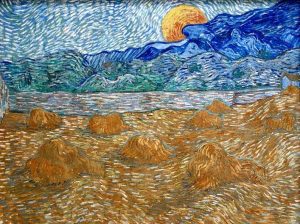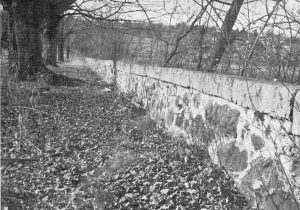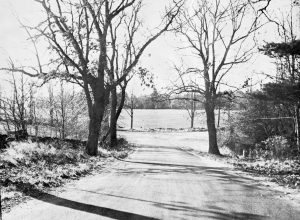A Childhood Not Entirely Lost
By S M Chen, posted by D Kovacs, Mar 17, 2016
“They who dream by day are cognizant of many things which escape those who dream only at night.” — Edgar Allan Poe, writer (1809-1849)
One of my early recollections: crossing the gently sloping, vast (it seemed so to me, although it was in reality only several acres) field that lay to the north of our house, for my weekly piano lesson with a Maggie Smith-like kindly, angular woman who had been a missionary to Africa and whose only daughter would go on to excel in piano and violin.
At summer’s end, a large tractor with motorized scythe would crop the tall brown grass close as a military recruit’s pate. Another machine would tie mown grass into rectangular bales, which would dot the field (somewhat reminiscent of the Van Gogh painting below) for a few days before they were collected and taken away to be sold to local farmers.

As I sat in a chair, six-year-old legs not reaching the floor, and waited for another student to finish her lesson, teacher was standing by the imposing black Steinway, involved in a discussion with her adult daughter.
“What really matters are motives,” she intoned. “That is what we will be judged by. If motives are right, everything else will follow.”
I had no idea what motives were.
“How does this tie in with morals?” asked daughter, whose features were softer.
“Not directly, I should say.” She had a not unpleasant accent, difficult to place. “What I am saying is that right motives are the important thing, regardless of how something turns out. And I daresay if the motives are right, usually the end result is salutary.”
“Are you allowing for exceptions to the rule?”
“Ah, exceptions… I rather dislike them, though they are inevitable, aren’t they?”
She turned to the girl with blonde curls who had been sitting quietly on the piano bench. “Sorry, child. I didn’t mean to interrupt your lesson. Carry on… Where were we, now?”
“We were on page five. But…” The curls looked at me. “I think maybe my lesson is about over.”
Teacher glanced at the ornate clock on the wall. There was nothing bourgeois in her taste. “You’re quite right. The young lad has been waiting patiently while I’ve been jabbering on. Off you go, my dear. See you next week. And don’t forget to practice your arpeggios.”
She turned to me. “Come, come, lad. Let’s see how you’re progressing.” She took my music book. I sat on the bench and struggled to reach the pedals.
“Just look at him,” she remarked to daughter. “Youngest of the clan, and a quick study, like the others.” She pinched my cheek with bony fingers and smiled.
In fact, the two children in my sibship who were most gifted at the keyboard were my sisters. The younger would one day obtain a master’s degree in organ performance, despite the fact her hands were smaller than mine and she could barely reach an octave. Years later, at her recital, along with my parents, I sat transfixed and nearly moved to tears by her lovely, flawless program, so proud she was my sister.
—–
Going home after piano lessons was both better and worse than the trip to teacher. Better because it seemed quicker. It would always be that way. Regardless of mode of transport, time compressed when home was the destination. And elongated when leaving home.
Worse because it had gotten dark during the lesson, and the unspoken amorphous terrors of the night loomed large. I hurried across the field toward the lights of home, trying not to stumble, not to show fear, not to let on that my little heart was racing, despite the fact that I was not running.
Nyctophobia stayed with me until adulthood.
Later, I was to realize that time and place had significant bearing on something as basic as light at night. Our town was small, crime was rare, and people often didn’t lock their houses or cars. Streets, other than main ones, were dimly lit if at all. People felt secure, not afraid of each other or of the nameless terror night held for many city folk, particularly in modern times.
I practiced the piano daily for about half an hour after school. Mother would fix me a peanut butter sandwich and glass of milk, which I finished before seating myself at the old faded upright, its varnished front surface slightly blistered from the heat of a house fire which had fortunately stopped short of consumption.
Mother would turn the arrow marker of a worn black plastic timer past 30 minutes and place the timer atop the piano with instructions not to leave until the bell rang.
How those 30 minutes often dragged. I’d dutifully practice assigned scales and pieces. Once or twice, I even nudged the timer along but decided that wasn’t such a good idea, so, with a sigh, I’d return to practicing and wish I’d not been forced into such drudgery.
As is the case with many, I would later rue the fact I had not practiced more assiduously or had more lessons than the year and a half that my parents insisted I take before their bank account, like my interest in keyboard, dwindled.
—–
The people for whom the field was named lived at the east end in an old dark-red wood house. During the years I lived there, I never met them, which I thought rather odd.
Northwest of the house, close to the street, sat a sizable, perhaps 100-foot-tall, horse-chestnut tree, whose fruit fell to the ground as copious green balls from which jutted sharp spines.
That tree recalled these lines from Henry Wadsworth Longfellow’s “The Village Blacksmith”:
Under a spreading chestnut-tree
The village smithy stands.
The smith, a mighty man is he,
With large and sinewy hands;
And the muscles of his brawny arms
Are strong as iron bands…
Toiling, rejoicing, sorrowing,
Onward through life he goes;
Each morning sees some task begin,
Each evening sees it close
Something attempted, something done,
Has earned a night’s repose.
Thanks, thanks to thee, my worthy friend,
For the lesson thou has taught.
Thus at the flaming forge of life
Our fortunes must be wrought;
Thus on its sounding anvil shaped
Each burning deed and thought.
A buddy and I would carefully open the husks with a pocketknife to shell out hard, smooth, shiny dark-brown conkers. We drilled small holes through the nuts and ran string through the holes, tying knots on the outside edge, to make crude bolos, which we’d swing around our heads and throw at various objects. The string would wrap itself around the target by virtue of the weighted ends.
A similar tree (Aesculus hippocastanum) was mentioned by Anne Frank in her Diary and stood until 2010 in the center of Amsterdam.
Traversing the field was necessary to reach fields and hill beyond the road that ran east-west, a two-lane asphalt way beyond whose northern edge ran a stone wall. It was not a high wall, scarcely waist-high to an adult, but did clearly demarcate the road from land to the north. Some of the rocks comprising the wall contained cross-stones – small pieces of dark gray granite containing white crosses. One brother had a number of these, smooth and hard, some lacquered. I was told they occurred naturally in only two states: where we were and California. California could have been another country, it was that distant. I could not know then that I was to spend most of my adult life there.

This rock wall recalled “The Mending Wall,” by Robert Frost, a favorite poet:
Something there is that doesn’t love a wall,
That sends the frozen-ground-swell under it,
And spills the upper boulders in the sun…
He says again, ‘Good fences make good neighbors.’
—–
The west end of the road bifurcated into two limbs that ran north and south, with a triangle of gravel separating the limbs.

This junction recalled another, likely better-known Frost poem (“The Road Not Taken”), which contains these lines:
Two roads diverged in a yellow wood,
And sorry I could not travel both
And be one traveler, long I stood
And looked down one as far as I could
To where it bent in the undergrowth…
I shall be telling this with a sigh
Somewhere ages and ages hence:
Two roads diverged in a wood, and I,
I took the one less traveled by,
And that has made all the difference.
In summer we flew kites, sometimes-flimsy, inexpensive ones bought from a local five and dime store. We attached tails made from strips of cloth rags, varying the length as the wind required for balance. One child would hold the kite up and the other, holding spool of string, would run away from the first at full speed, begging the wind to catch the kite and bear it aloft.
The best kite I ever had was an Army surplus box kite with orange cloth and folding aluminum struts. It required no tail and flew higher than any others I’d had. I used a large varnished wooden spool around which was wound over a thousand feet of black nylon twine. While winding the line was tedious, letting it out was a cinch after running a stick through the center hole of the hollow spool. We’d write a message on a small square of paper, slip the paper onto the string, and watch the paper travel, often spinning, up to the kite like heaven-bound prayer.
The four-leaf clover being a supposed talisman of luck, I’d hunt for such in the field at the base of the hill beyond the wall. Once I found not only a surprising number of four-leaf specimens, but also a few five- and six-leaf clovers. I was not surprised that no apparent good fortune followed thereafter; I never believed much in luck, putting more stock in the preparation and hard work that I witnessed my parents employ. I identified with Louis Pasteur’s observation that “Chance favors the prepared mind.”
In winter I trudged to the top of the hill, pulling my wood sled with metal runners. Planting the sled with care at a propitious spot near the crest, I plopped myself face down on the sled, grabbed the front of the sled with mittened hands, and pushed off with my boots. I always made sure I stopped short of the polluted brook which ran north-south and lay slightly beyond the bottom of the hill, for it was into this brook that a fellow sledder once went, emerging sadder but wiser.
Toboggans also came down the hill. Their riders seemed to have the most fun, since there were usually at least several of them, often including girls, whose screams of fright and delight, particularly as they went over a bump, mingled with other lesser sounds of youngsters at play.
At the end of sledding, I would trudge home, my sled’s runners beginning to ice up as temperatures, along with the sun, dropped. My fingers and toes were invariably cold, sometimes almost frostbitten. My mother would greet me at the front door and strip my wet outer garments. I’d stand shivering on the kitchen linoleum in long johns. She’d place my hands in her soft, warm axillary recesses and my feet in a pan of hot water. She’d fix me a cup of hot Postum. Sitting wrapped in a warm blanket, I’d think I was so lucky to have such a mother. And indeed I was.
At least one of my siblings mentions similar treatment at her hands, so I was not the lone recipient of my mother’s kindliness.
My father, too, was a good person. A very good man, in fact.
—–
As I mull over what went before (and there was much more; the surface has been but scratched), I conclude that, through grace and/or good fortune, I had far better parents than I deserved.
I am indeed blessed.




